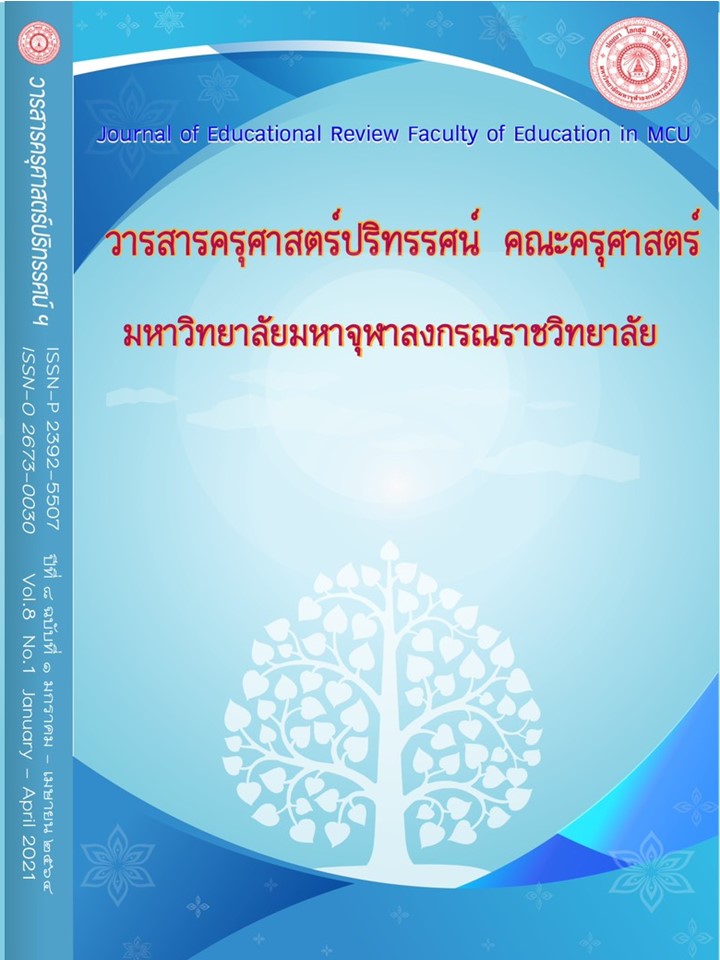LEARNING MANAGEMENT TO ENHANCE RESILIENCE COMPETENCY ON CLOUD TECHNOLOGY BASED ON DISC MODEL IN CRISIS
Main Article Content
Abstract
This article tries to present learning management during crises that occur whether it is an epidemic or a natural disaster including the changing conditions arising from digital disruption. They currently affect people of all ages unexpectedly in both economic and social sectors. Dealing with such situations, we must have 1) knowledge that must be diligent, follow up, study and find knowledge that is constantly updated. 2) understanding of uncertain conditions at any time that is inevitability 3) individual adaptation to a meaningful existence. Resilience competency should be support and strengthen at all education levels. This competency will make the group of people today ready for a new way of life.
DISC model help to group learners and is a guideline for choosing a suitable development model initially. The test taker knows what behavior is likely under normal conditions. The whole process is the learning management on cloud technology. The objective is to provide the target audience with convenient access to educational materials suitable for their lifestyle. They are going to be a group of people that will influence the world in the near future.
Resilience competency is the ability to perceive, understand and accept reality that actually happens, but we do not succumb to the difficult situation that arise. We live with life strong-minded, stable, and are ready to face problems. We try to overcome obstacles and move on. Time may heal the trauma that occurs in the individual, but the resilience competency will help people go through suffering quickly. The main reason is that we already know what the meaning of life is. We also know the value in ourselves. This is the motivation that try to survive in any crisis that occurs in life.
Article Details
ทัศนะและความคิดเห็นที่ปรากฏในบทความในวารสารฉบับนี้ถือเป็นความรับผิดชอบของผู้เขียนบทความนั้นเพียงผู้เดียว และไม่ถือเป็นทัศนะและความรับผิดชอบของกองบรรณาธิการ
กองบรรณาธิการขอสงวนสิทธิ์ในการคัดเลือกบทความลงตีพิมพ์และจะแจ้งให้เจ้าของบทความทราบหลังจากผู้ประเมินบทความตรวจอ่านบทความแล้ว
ต้นฉบับที่ได้รับการตีพิมพ์ในวารสารครุศาสตร์ปริทรรศน์ คณะครุศาสตร์ มหาวิทยาลัยมหาจุฬาลงกรณราชวิทยาลัย ถือเป็นกรรมสิทธิ์ของคณะครุศาสตร์ มหาวิทยาลัยมหาจุฬาลงกรณราชวิทยาลัย ห้ามนำข้อความทั้งหมดหรือบางส่วนไปพิมพ์ซ้ำ เว้นเสียแต่ว่าจะได้รับอนุญาตจากมหาวิทยาลัยฯ เป็นลายลักษณ์อักษร
References
กรมสุขภาพจิต. (2563). กรมสุขภาพจิตเผยผลกระทบของสถานการณ์การแพร่ระบาดของโรค COVID-19 ส่งผลต่อเด็กและเยาวชน. แหล่งที่มา http://www.prdmh.com/ข่าวสาร/ข่าวแจกกรมสุขภาพจิต/1504-กรมสุขภาพจิตเผยผลกระทบของสถานการณ์การแพร่ระบาดของโรค-covid-19-ส่งผลต่อเด็กและเยาวชน.html. สืบค้นเมื่อ 16 ต.ค. 2563.
เขมจิรา จิตตะยโศธร. (2562). การเสริมสร้างความสุขสำหรับนักศึกษาฝึกประสบการณ์คอลเซ็นเตอร์ด้วยการประยุกต์ใช้การโค้ชแบบสุนทรียสาธก. วิทยานิพนธ์บริหารธุรกิจมหาบัณฑิต. มหาวิทยาลัยขอนแก่น.
จิตรภานุ ดำสนวน. (2562). ปัจจัยที่เป็นตัวพยากรณ์ภูมิคุ้มกันทางใจของวัยรุ่นในอำเภอหนองกี่ จังหวัดบุรีรัมย์. วิทยานิพนธ์ปริญญาพุทธศาสตรมหาบัณฑิต. มหาวิทยาลัยจุฬาลงกรณราชวิทยาลัย.
ชนินทร์ ฐิติเพชรกุล, ณรงค์ สมพงษ์ และณัฐพล รำไพ. (2563). การพัฒนารูปแบบการจัดการเรียนรู้บนระบบคลาวด์คอมพิวติงตามแนวคิดคอนเน็คติวิสต์ซึมเพื่อส่งเสริมการรู้เทคโนโลยีสารสนเทศและการสื่อสารสำหรับนักศึกษาระดับปริญญาตรี. วารสารราชพฤกษ์. 18(1). 38-48.
นาฏนภางค์ โพธิ์ไพจิตร์. (2560). ปัจจัยเชิงพุทธจิตวิทยาที่มีความสัมพันธ์กับความเข้มแข็งในการฟื้นพลังของวัยรุ่นในกรุงเทพมหานคร. วารสารสันติศึกษาปริทรรศน์ มจร. 5(1). 253-263.
เพ็ญนภา กุลนภาดล. (2562). การให้การปรึกษาวัยรุ่น. พิมพ์ครั้งที่ 4. ชลบุรี: เก็ทกู๊ดครีเอชั่น.
มหาวิทยาลัยราชภัฏวไลยอลงกรณ์ ในพระบรมราชูปถัมภ์. (2553). คู่มือการจัดระบบการเรียนการสอนที่ยึดผู้เรียนเป็นศูนย์กลางการเรียนรู้. กรุงเทพมหานคร: โรงพิมพ์เทียนวัฒนาพริ้นท์ติ้ง.
วิจารณ์ พานิช. (2562). วิจัยชั้นเรียนเปลี่ยนครู. กรุงเทพมหานคร: มูลนิธิสยามกัมมาจล.
สถาบันสุขภาพจิตเด็กและวัยรุ่นราชนครินทร์. (2563). เปิดสถิติ วัยรุ่นไทยขอคำปรึกษาสายด่วนสุขภาพจิต 1323 มากสุด ปัญหาความเครียดอันดับ 1. แหล่งที่มา https://www.thaipost.net/ main/detail/56782. สืบค้นเมื่อ 16 ต.ค. 2563.
Disc personality testing blog. (2020). What is the DISC Model. From https://discpersonalitytesting.com/blog/what-is-the-disc-model/ Retrieved October 16, 2020.
Garmezy, N. (1987). Stress, competence, and development: Continuities in the study of schizophrenic adults, children vulnerable to psychopathology, and the search for stress-resistant children. American Journal of Orthopsychiatry. 57. 159-174.
Garmezy, N. (1991a). Resilience in children’s adaptation to negative life events and stressed environment. Pediatric Annals. 20. 459-460, 463-466.
Hough, J. B. and Duncan, J. K. (1970). Teaching description and analysis. Boston: Addison-Wesley.
Macmillan dictionary blog. (2020). Resilient. From https://www.macmillandictionaryblog.com/ resilient#:~:text=Origin%20of%20the%20word,to%20mean%20'springing%20back'. Retrieved October 16, 2020.
Marston, W. M. (1928). Emotions of Normal People. London: The Devonshire Press.
Prensky, M. (2001). Digital Native, Digital Immigrants. On the Horizon. 9(5). 1-6.


